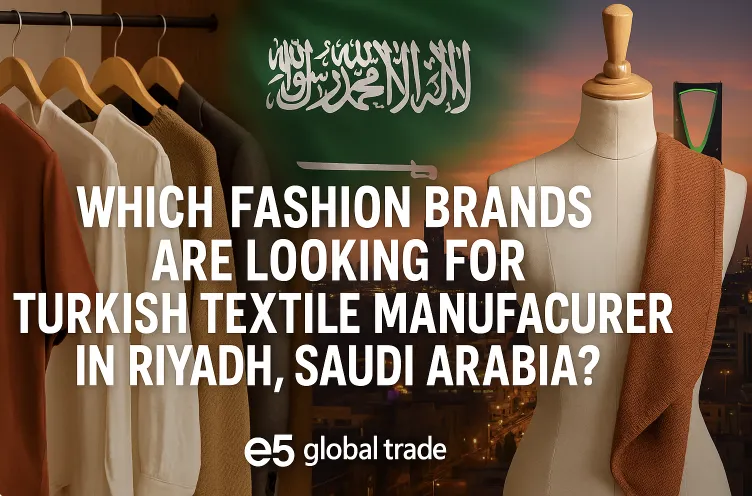Fashion Brands Seeking Turkish Textile Manufacturers in Riyadh, Saudi Arabia: The Gateway to a New EraSaudi Arabia has been a rapidly transforming market in recent years. Major reforms have been implemented in social, economic, and cultural life as part of the 2030 Vision. One of the most visible reflections of this transformation is the boom in the fashion and apparel sector. Riyadh is no longer just a political center; it has become one of the Middle East's new fashion capitals. Local designers, luxury shopping malls, fashion weeks, digital platforms, and a young population have transformed the city into a dynamic consumer hub. At the heart of this growth is the need for textile manufacturers with high-quality, fast, and reliable production. Turkey, with its geographical proximity, production quality, immersion in Middle Eastern culture, and capacity to produce at European standards, has become Saudi Arabia's preferred production partner. Local fashion brands, particularly those based in Riyadh, are no longer outsourcing their production to distant lands, but are turning to Turkish manufacturers. However, these brands are often not recognized internationally. These are typically medium-sized, family-run businesses, or local brands founded by women entrepreneurs. These brands cater to both local demand and expand into regional (Kuwait, UAE, Bahrain) and even global (e-commerce) markets. Most of these brands operating in Riyadh aim to produce hygienic, hijab-compatible, sustainable, premium-quality, and fashionable clothing. There is high demand for product groups such as abayas, dresses, tops, trousers, dress bottoms, and summer collections. However, these brands lack their own production facilities. Therefore, they outsource their production processes to contract manufacturers. When searching for these manufacturers, they prioritize quality, rapid sample production, flexibility in small batches, communication in English, and sustainable production. Some of these brands come to Turkey directly to seek out manufacturers. However, more brands seek suppliers through Riyadh-based textile consulting offices, production coordinators, or export consultants. These offices understand the brand's design and coordinate with the manufacturer on quality, price, and delivery. Contacting these offices for Turkish manufacturers can be more effective than reaching out directly to the brand. In Riyadh, local fashion brands such as Sulafa, Rosh Ray, Haya Karima, Dima Ayadi, Yousef Al-Jasmi, Noura, Noor Riyadh, and Liali have openly stated in recent years that they have been working with Turkish-based manufacturers for their production. Some of these brands have been using phrases like "Our production is in Turkey" on social media. This isn't just a production preference; it's a message of quality and trust. Internationally recognized designers like Dima Ayadi, in particular, produce a significant portion of their collections in Turkey. However, working with these brands doesn't just require production skills. Certifications, quality assurance systems, sample processes, ethical production policies, and prompt communication are essential. Brands want to be informed at every stage of the production process. The manufacturer should be a partner, not just a machine. Furthermore, Arabic information should be present in packaging, labeling, and product presentation. Details such as shelf life, hygiene, and packaging materials are also taken into consideration. The major advantages of Turkish manufacturers include their familiarity with Middle Eastern standards, religious and cultural sensitivity, a hijab-friendly design approach, and short logistical distances. It takes three hours from Istanbul to Riyadh by air and two to three days by land. This proximity makes a significant difference both in sending samples and for urgent production changes. In recent years, trade fairs supported by the Turkish Ministry of Foreign Trade, DEİK, and the Istanbul Chamber of Commerce (İTO) (especially fashion and textile fairs held in Saudi Arabia) have contributed to the development of these collaborations. At these events, Riyadh-based brands meet directly with Turkish manufacturers, receive samples, and make agreements. Furthermore, some Turkish companies have begun opening their own representative offices in Riyadh. This is crucial for building trust. As a result, the number of fashion brands seeking Turkish textile manufacturers in Riyadh is increasing daily. These brands are looking for not only products but also value, reputation, and cultural harmony. Turkish manufacturers can meet these expectations. However, this requires not only machinery but also professional communication, consistent quality, sustainability, and a long-term partnership approach. The doors to Saudi Arabia are opening. To pass through these doors, brand awareness must be strong, alongside production. Because fashion is no longer just clothing; it's an identity. And the producers are the ones shaping that identity.
E5 Global Trade | Yazılar
Fashion Brands Seeking Turkish Textile Manufacturers in Riyadh, Saudi Arabia: The Gate to a New Era


